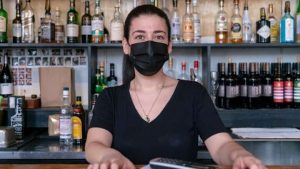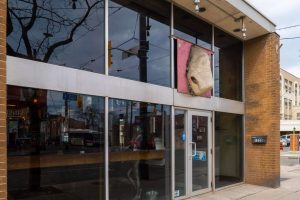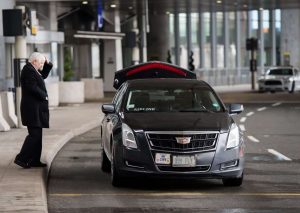Fewer Toronto restaurants cancelled business licences in first year of COVID-19 than normal

Despite public health restrictions, fewer Toronto restaurants, bars and cafes have cancelled their licences with the city in the year since the first COVID-19 lockdowns than in any given year for the last two decades.
COVID-19 could shutter more than 200,000 Canadian businesses forever, CFIB says
CBC News analyzed Toronto business licensing data to get a sense of the toll the pandemic has taken on various business sectors in the city.
Between March 23, 2020 and the same date this year, 1,177 eating establishments in Toronto cancelled their licences, or the city cancelled them after the businesses failed to pay the $307 annual renewal fee. That’s 21 per cent less — or 279 fewer restaurants — than the 20-year average of 1,456 cancelled eating establishment licences per year.
Although those numbers may seem counterintuitive given the financial strain on a sector that was reduced to takeout and delivery for much of the year, the president of the Canadian Federation of Independent Business (CFIB) says it’s no surprise.
“There are a lot of zombie businesses out there, businesses that are effectively dead, but the body doesn’t know it yet,” Dan Kelly told CBC News.
“When the government subsidies start to be scaled back … a lot of business owners are going to have a moment of reckoning.”
CFIB predicts a third of restaurants will close
If COVID-19 vaccines allow for a return to something close to normal by the fall, Kelly believes that’s when many businesses will call it quits.

The CFIB is predicting that a third of restaurants across Canada — more than 30,000 — may permanently close as a result of the pandemic.
“Many business owners are going to be looking at the books and are going to be facing, on average, $170,000 in COVID-related debt,” he said.
“It’s at that stage that they’re going to say, ‘You know what? There’s no pathway back to profitability.'”
‘It’s a second home for me’
Margio Rana’s family-run Italian restaurant is one of more than 7,400 eateries in Toronto that have maintained its business licences, despite the financial challenges of the last year.
The 32-year-old took over Gio Rana’s Really Really Nice Restaurant — also known in Leslieville as “the Nose” because of the giant nose above its entrance — from her parents. They opened the east-end business the same year Rana was born.

“It’s a second home for me,” said Rana. “It’s not only been my life, it’s been my parents’ life, their 40 years of hard work.”
Rana estimates that business has been down 60 per cent or more during the pandemic, with the restaurant largely relying on government subsidies, takeout and delivery orders, and its first-ever patio to survive.
A recent Statistics Canada questionnaire found that roughly 43 per cent of food services and drinking establishments across the country experienced a 40 per cent or more decline in revenue last year — and that most businesses in the sector can’t afford to take on more debt.
“The only reason why many places are here now is because there are subsidies that are helping us,” Rana said. “Unless we’re open full capacity, it’s really not bringing enough business to pay our fixed costs — which is the kind of sad reality of it all.”
In a statement, a City of Toronto spokesperson told CBC News eateries still need a licence to operate during the pandemic. But the city has waived late fees to give businesses 90 days past their expiry to renew their licences before they’re cancelled.
Spike in cancelled driving instructor and limo licences
While business licensing numbers show the vast majority of eating establishments are still holding out hope, spikes in licence cancellations in other sectors tell a different story.
The number of driving instructors and limousine service company licences cancelled during the first year of the pandemic was up between 75 and 82 per cent compared to 2019.

Thirty-six of the 55 limousine service companies who were licensed in Toronto cancelled their licence in the first year of the pandemic — an 82 per cent increase compared to 2019.
“Our industry survives on everything that isn’t happening right now,” said Joe Ironi, a director with the Ontario Limousine Owner Association.
“Where there’s no destination, there’s no transportation needed.”
Driving instructor Tasnim Bala says many of her colleagues cancelled their licences and started driving for a ride-sharing service, or moved into the trucking industry, because COVID restrictions meant they weren’t allowed to take students on the road for the majority of last year — and they still can’t work in Toronto and Peel under the grey-level lockdown restrictions.
“All my savings are going to pay [car] insurance right now without having work,” Bala told CBC News. “I had to cut down on all my expenses; groceries I hardly buy once a month.”

Bala and other members of the Association of Driving Schools and Instructors of Ontario (ADSIO) want the province to help them get breaks on their commercial insurance when they can’t work — to prioritize instructors for COVID-19 vaccinations and to make more instructors eligible for the Ontario Small Business Support Grant.
ADSIO has also written letters to several Ontario municipalities asking them to waive the annual renewal fee for driving instructor licenses.
Nearly 190 Toronto driving instructors cancelled their licences since the start of COVID-19, a 75 per cent increase in cancellations from 2019.
Bala has kept her instructor’s licence, but had to give up the Scarborough driving school she ran for the last six years — and cancel the licence she had for it — last fall because she could no longer afford the rent.
“It’s so hard,” she said.
“I had to give up three months of my rent to get out of my lease … and my family also went through the hardship of COVID.”








Redes Sociais - Comentários